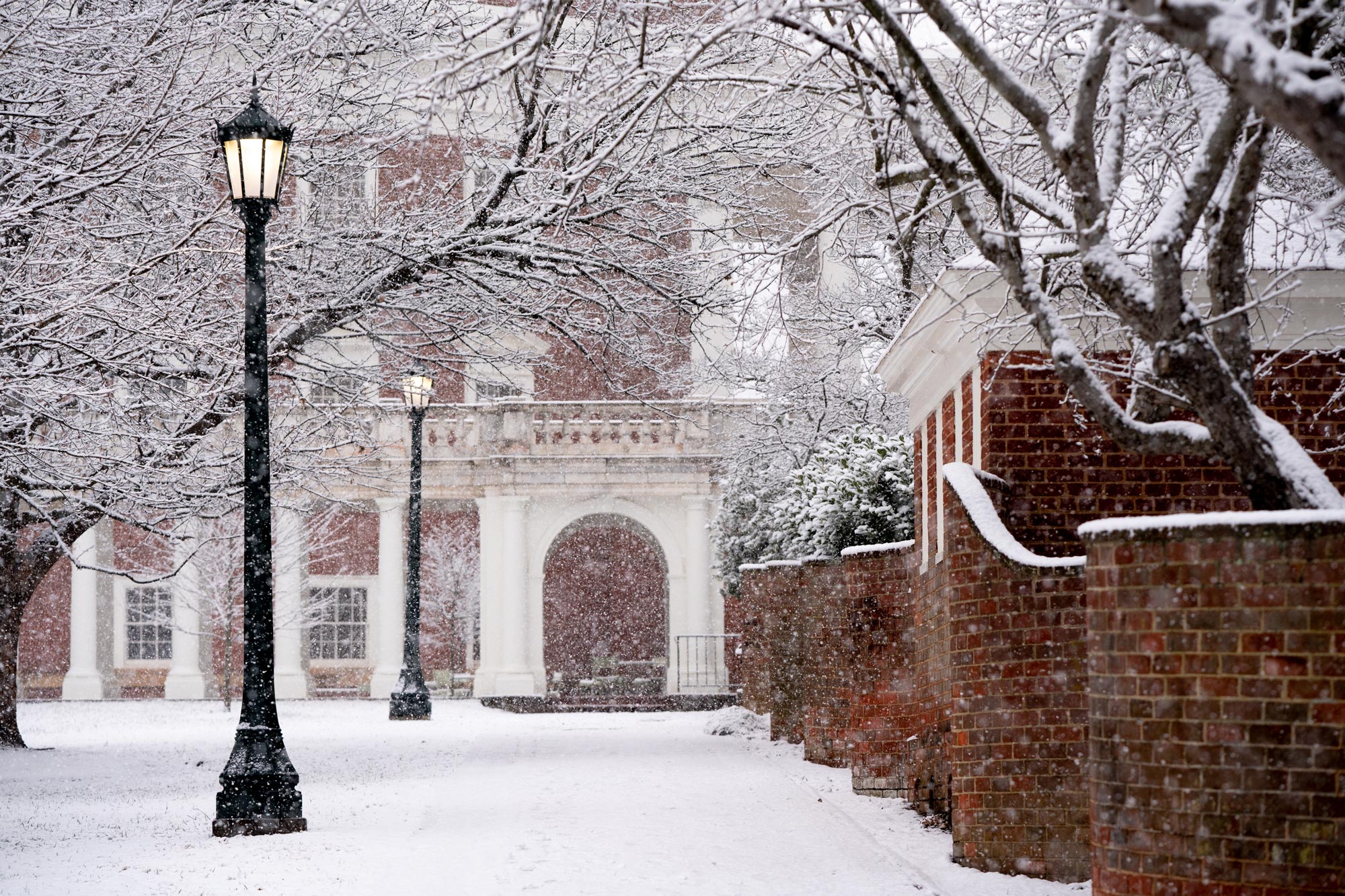Some January term courses at the University of Virginia enrolled more than 400 students. Some had 15. All challenged students to devote the term’s two weeks, Jan. 4 through 15, to making the most of a virtual format instead of in-person. By a slew of accounts, the 100-plus courses provided exciting and lasting experiences for instructors and students alike.
Several courses covered topics that were “evolving in real time,” as one professor put it, including threats to U.S. democracy and the threat from a new strain of the coronavirus.
Many aimed at helping students understand and analyze present challenges, whether they be tied to the pandemic, politics, climate change or inequality, said Dudley Doane, who directs J-Term, international, summer and special programs.
“I couldn’t be prouder of our entire J-Term staff and all our faculty for developing this robust, innovative format and content on a short timeline," said Liz Magill, executive vice president and provost. "This year’s J-Term showcases their creativity and dedication to providing a meaningful learning experience for our students.”
In their January term course, media studies professor Siva Vaidhyanathan and history professor Will Hitchcock tackled “Democracy in Danger,” adding a course component to their podcast of the same name and their work for UVA’s Democracy Initiative. The course couldn’t have been timelier, with a new president coming into office on Jan. 20.
Some courses explored other broad subjects such as how we became human and got to where we are today, especially considering some of the global challenges facing humankind. Other courses focused more closely on a timeless topic, such as practicing leadership skills in the arena of athletics.
With large virtual lectures, professors turned to teams of teaching assistants, who usually led smaller groups in afternoon sessions. They also incorporated visiting speakers into their virtual classrooms, used the case-study method and assigned small-group projects.
Here are several examples of January term courses that made an impact on many students.
Global Advocacy, Democracy and Public Narrative
When English professor Stephen Parks and Serbian activist Srdja Popovic first planned the signature course, “Global Advocacy, Democracy and Public Narrative,” they expected about 30 students in what was ostensibly a writing course. When close to 400 enrolled, they had to rethink a few things, but not the power of the written word and value of nonviolence.
And then the storming of the U.S. Capitol on Jan. 6 added a new example to contrast with peaceful protest, democratic principles and methods for addressing divisive issues.
Parks and Popovic had already planned to have a wide-ranging roster of guest speakers who are activists, including Andre Henry of Black Lives Matter; from Hong Kong, Johnson Yeung, former convener of the Civil Human Rights Front and secretary-general of the Hong Kong Federation of Students; Danielle Ayers, CEO of #MeToo in the U.S.; and Syrian Bassam Alahmad of Syrians for Truth and Justice, an organization he co-founded with Parks.
Among several roles over recent decades, Popovic was a leader of the organization Otpor! that helped topple Serbian dictator Slobodan Milosovic in 2000, and a few years later, he co-founded the Centre for Applied Non-Violent Actions and Strategies, known as CANVAS, that promotes non-violent advocacy for democracy and human rights and has worked with people in more than 35 countries.
He has taught at several universities in the U.S. and Europe, and made a point of saying he was amazed at the levels of interest and engagement from the UVA students.
Parks said they worked to mitigate what might seem impersonal with the large enrollment. In his constant communication with the students, he “intentionally modeled community-building practices in our daily sessions – practices which distributed authority and decision-making across our community, practices which intentionally opened up access for insight from everyone involved,” he wrote in email.
First-year student Lydia Qian wrote that she appreciated this aspect of the class and looks forward to meeting some of her classmates in person.
“There was a personal touch to it and the enthusiasm and passion the professors and guest speakers had for their lessons, their movements, their activism, was palpable and infectious,” she said.
When the riots caused havoc at the U.S. Capitol, “This event provided a real-time and very sobering example for morning lecture, a true and real example of what the class was about. Professor Parks and Professor Popovic led us step by step through this protest/riot, how and why it failed, others like it, and answered our countless buzzing questions we all had at such a monumental time like this,” Qian wrote.
Iris Jung, another first-year student, wrote that “the relationship with the students and instructors was what made this class phenomenal.”
The fact that it was extremely relevant to our current state in the U.S. was attractive to me, because I hoped it would allow me to become a more informed and engaged citizen – which it did.
— Kristina Swingle, second year, on “Global Advocacy, Democracy and Public Narrative”
Before coming to UVA, Jung had lived in several countries throughout Latin America, she wrote. “The countries I called home constantly struggled with government corruption, human rights violations and violence. Although I was horrified, these experiences pushed me to witness the importance of advocacy and democracy.”
Learning “how to write with persuasive rhetoric” is something she now considers essential. “Although writing can seem insignificant, this can be what unites so many around the world,” she wrote in email. “Through this course, I felt a certainty that I could do something and create an impact.”
Pandemics Beyond the Headlines: COVID-19
Taught by David Leblang, professor of politics, and Roseanne Ford, professor of chemical engineering, this signature course held 500 students, from first-years to fourth-years, across several schools and many different majors. That didn’t deter from making the course “something special,” as third-year student Jack MacLeod wrote, adding that the instructors “organized, guided and taught hundreds of students with a degree of excitement, engagement and sincerity that I have not yet encountered in a virtual setting.”










